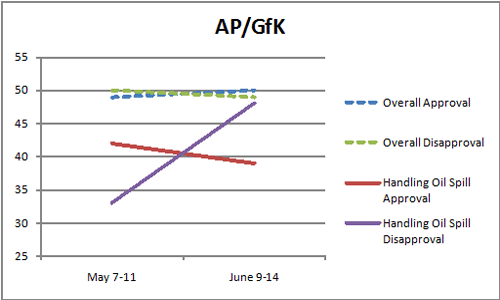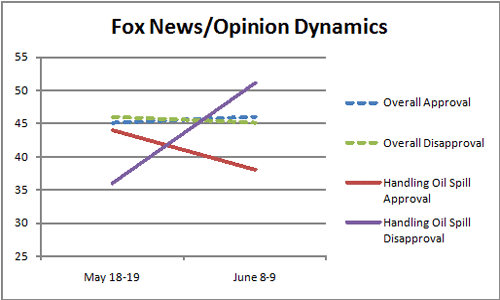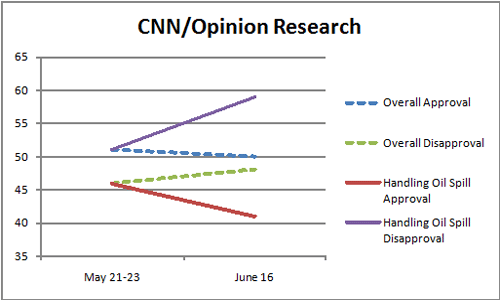The relatively disappointing reaction to Obama’s prime time Oval Office address, against the backdrop of BP CEO Tony Hayward’s Sergeant Schulz-like testimony (“I see nothing! I hear nothing!”) before a congressional committee, and the seemingly nonstop coverage of the spill itself, have collectively contributed to the impression that we’ve reached an “inflection point” in the Gulf oil crisis – but not the one for which the White House hoped. Instead, critics (see here and here and here) are suggesting that Obama’s handling of the crisis is threatening not just Democrats’ fortunes in the 2010 midterms, but Obama’s reelection chances in 2012. Perceptions of his leadership are rapidly approaching Carteresque territory, with the daily headlines – Day 59 of the Gulf Crisis! – reminding viewers of Nightline’s nightly announcement of how long Americans were held hostage in Iran during Carter’s presidency.
To support the claim that the Gulf oil spill is in danger of becoming Obama’s hostage crisis, critics note that public support for Obama’s handling of the spill has dropped. In this regard, Tom Bevan posts the following poll results at RealclearPolitics:



According to Bevan, that’s a drop in the public’s approval of Obama’s handling of the oil spill of 18 points in the latest AP/GFK poll, 21 points according to Fox News and 13 in CNN’s polls. As Bevan notes, other polls find a majority of Americans criticizing the President for his failure to act quickly enough in responding to the crisis, and for being too lenient on BP.
Perhaps most alarming, the latest USAToday/Gallup poll indicates a majority (51%) of all adults (not just likely voters) now believe Obama should not be reelected in 2012. All this has not been lost on the White House, which explains, I think, the concerted public relations efforts in recent weeks to show that Obama is on top of the issue; he has made four trips to the Gulf coastline, in addition to his nationwide address, and his top aides have fanned out to news shows defending the administration’s response.
At the risk of heresy, let me make the following assertion: politically speaking, the oil spill is not that big a deal. Note: I’m not trying to minimize its environmental implications, nor the urgency to cap the leak. But politically it should not be Obama’s top priority. Indeed, rather than pursuing a no-win strategy of appearing to be on top of an issue over which he has no control, Obama would be far better off by distancing himself from the spill. The reason is that the public is smart enough to realize he’s not responsible for the initial explosion at the oil rig, and they still believe BP should take primary responsibility for the cleanup.
But what about these disastrous poll numbers? It’s true that the public doesn’t think Obama has handled the spill very well – but that’s because Obama continues to insist that he’s in charge, and yet the oil continues to spew. If we step back from oil spill, however, and look at Obama’s overall approval numbers (see the polls above), they’ve barely budged from what they were before the spill, suggesting that the public is fully capable of separating their judgment of his reaction to the spill from their overall evaluations of him as president. Bevan suggests that Obama’s numbers should have gone up after the spill as the public rallies behind the President. I’m skeptical – the oil spill is not the same rally-round-the-flag type event that normally boosts a President’s poll ratings.
Instead, I think the lesson from these polls is that the public is quite capable of distinguishing Obama’s reaction to the spill from his overall performance as president. This distinction is easy to lose if one focuses solely on the daily diatribes about the oil spill that continue to dominate cable shows and opinion columns. But we shouldn’t confuse the punditocracy’s need to fill airtime with the real concerns of most Americans.
What about those reelection numbers? Same thing: they haven’t changed from what they were before the spill. Here’s the Gallup poll data showing that despite the perception that he’s mishandled the spill, support for his reelection hasn’t changed from what Gallup was recording before the explosion:

In short, there’s no evidence yet that the public’s overall assessment of Obama’s presidency is being eroded by his ham-handed reaction to the oil crisis. The reason why, I think, is because when prioritizing their concerns, the public is far more interested in jobs and the economy. Oil spewing from a broken pipe may make for great visuals, and it certainly affects the livelihood of the Gulf coast residents. It may even be one of the greatest environmental disasters in U.S. history (although at this point it’s not even the biggest oil spill). But for most Americans, it’s an abstraction – something they see on their television screens but which doesn’t affect them directly. Indeed, a slight majority of Americans continue to favor off-shore drilling for oil (although there is less support for expanding those efforts beyond current levels).
Given these dynamics, Obama would be far better off stepping back from the Gulf spill and turning over daily responsibility to a cabinet secretary, such as Interior Secretary Ken Salazar, or some other figure. Let Salazar become the administration’s public face of this disaster. Obama should move on to those issues – jobs, the economy, Afghanistan – that are of greater concern to voters, and over which he may have greater influence. The alternative – repeated shots of him expressing concern about the spill interspersed with video of crude bubbling to the surface and images of oil-slicked seagulls – simply reminds voters of how little he can do to stop it.
